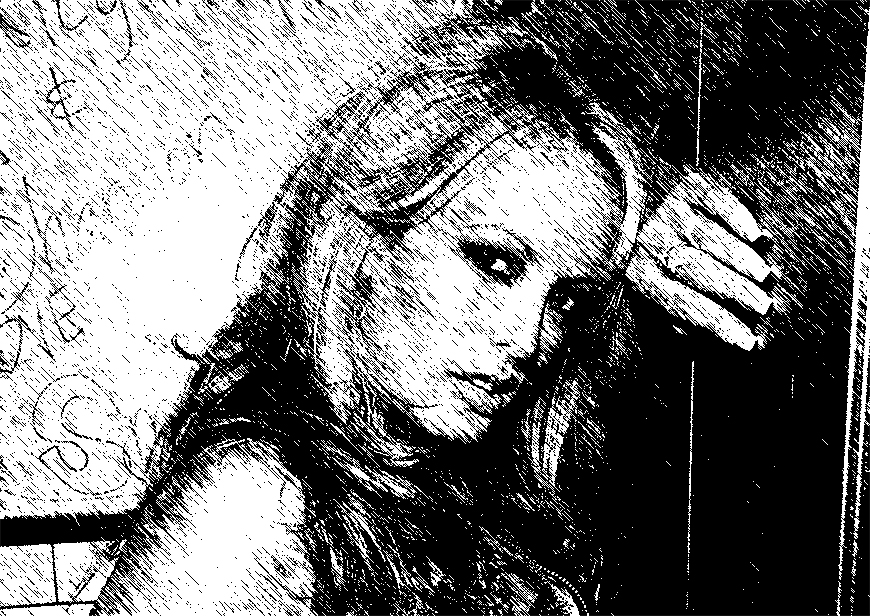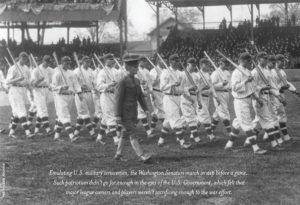The porn star & the president. One nation’s not quite love story.

There’s an unruly tag poking out from behind the black bra strap, between the defined blades of her shoulders, and she bounces up onto the stage, two, three, wiping down the stripper pole like a scrub nurse. In one gravity defying motion, she—brunette, pimples, ponytail—shimmies up the pole, thighs like a vice, she’s high, now impossibly higher, bumping against the ceiling, smiling down upon us like a winged seraph. Then comes slamming down—a firefighter, or a loser in a country-fair greased pole contest—as the amplified music, an unholy alliance of Classic Rock and nuevo synth, beats beneath the voice of the MC. The crowd, vaguely piqued, vaguely under- eroticized, waves two-dollar bills, she tucks them in her thong and scampers off stage, met by the club’s handler with a towel and helping hand.
It’s Stormy Daniels night at TJ’s Showcase in Scarborough, Maine, part of her national Make America Horney Again tour, and locals pack the place. I’ve been here since eight, it’s ten, no ten thirty, still no sign of Stormy, still a panoply of young women in underwear, fishnets, as variously, vigorously tattooed as Queequeg, chatting up the patrons (“clients”) for twenty-five buck (plus tip) dances. There’s a milling of regulars who’ve come out on a Thursday night to share the room’s dwindling oxygen and the dancers’ singular perfume. My legs are getting stiff from not budging from the position I’ve staked out at the bar, my budget’s wearing thin from the seven dollar beers, and I turn to reading a biography of Mark Twain I’ve been trying to finish for days. I came to bear witness to what I thought could develop into a blood feud between reds and blues, a tableau of the country’s polemical woes played out in the unlikeliest of venues, but nothing of the sort seems to be developing. A couple days after tonight I read that indeed there’ve been sign-carrying Stormy supporters rallying outside other clubs on the tour, but if any liberals like me have shown up tonight to be sanctified in Stormy’s presence, there’s no evidence of it.
There’s not a single MAGA hat in sight either, no hoots of derision, no talk of impeachment or insurrection, no storming of the barricades. As meme measuring, my reportage appears a bust. Still—by ten thirty the place is filling. Some middle-aged guys who look like they’re back from a day’s charter fishing expedition congregate by the bar, chatting up the dancers, who sense money in the water. A posse of twenty-somethings shuffles in in matching t-shirts: a bachelor party of decent seeming guys on a mission. A smattering of housewives and househusbands on risqué date night, it looks like, extend bills toward a new dancer on stage, who accepts them between her breasts with a shrug and grin before slipping away. In light of Metoo, such congregational illusions, sustained by alcohol, perfume and suspension of disbelief, can seem a relic of the frathouse, retrograde male hegemony, and casual Trumpian indifference to any but the most superficial, utilitarian aspects of another’s existence. Pure transaction. But you can’t help thinking there’s also an element of high theatricality here, gymnastic attainment that might just be worth the price of admission. It’s genuine showbiz razzmatazz of a sort—purveying desire and desirousness as spectacle. The dancers are hustling entrepreneurs, making a living American style, winking at the fakery of the apparatus, like magicians with a twinkle in their eye before they saw the assistant in half.
I try interviewing people. The proprietor of a restaurant a few towns away tells me he just wandered in, and is miffed at having to pay ten bucks over the usual ten for admission. Another guy, Sean—late twenties, goatee, with the look of a recently retired decathlete—explains he’s here because he “misses someone.” The Someone, an ex- in Portland, dumped him a few months ago. In the history of burlesque and can-can and ankle shows there must be more than sufficient number of lonely guys who seek comfort in dancers and can-can girls to populate several large midwestern metropolises, but if you ask me it’s a poor bet that TJ’s Showcase will assuage the heartache of any of them; but Sean’s got a plausible schtick, a patter that he claims is effective in securing attention: the genuineness of his feeling, he tells me, gets him a discount on lap dances.
Dancers, he says, genuinely come to love him, and he wields a slick narrative.
Maybe so, I nod, trying to decipher cabalistic meaning in the disclosure. But then, apropos of nothing it seems, he tells me that maybe a caucasian couldn’t totally understand what he’s getting at. The position of a white man in America is always one of privilege, he says, leaning in for emphasis. Sean is African American. I’m not. But I believe in my perhaps privileged way that the commonality of human spirit trumps identity politics most of the time, and Sean’s is a diversion that has strayed from the point that we manipulate that emotion in an attempt to recapture something genuine. I scribble notes on my hand (my notebook having been impounded at the door), and, feeling emboldened, broach the subject of Trump. Sean declines the bait. He’s here for a good time. Not just forget his Portland sweetheart, I deduce, but in some way forget what it means to be black in America under the administration of an avowed, unrepentant bigot. Perhaps he’s right: the right to dwell for a moment in the half life of an American strip club is a way of getting out from under oppression in love or race.
I look around for more potential interviewees, when at once the crowd grows remarkably still. And here she is.
Collectively we hold our breath. We regard her with an awe afforded a lesser order deity but deity nonetheless. Stormy. Over the sound system, the disembodied MC proclaims, Stormy Daniels, Stormy Daniels, Stormy Daniels, like she’s a pro wrestler, or one of those trucks with enormous wheels that drives over a row of twenty Volkswagens. It’s the default mode of marketing, I think, denoting something transcendental, the pushy imperatives of our time. Her entrance music is Steve Miller’s Abracadabra (Reach out and grab ya—). She bounces up on stage wearing black tails, a jauntily bespangled top hat, which gets tossed to a lucky fan. She lifts her knees like a majorette, shakes her leonine mane, flashes a perfect smile, and gets down to business. In fifteen seconds her shirt’s off, twenty seconds tops. With sisterly camaraderie, she goes for the women flashing bills at her. If I were to guess, I’d guess that Stormy understands the construction of comedy as well as any stand-up in the country, tragedy-as-farce is her stock-in-trade.
What must she think of the fun-house mirror of her life? I wonder. In the liminal realm of politics and sex, does she take measure of how others see her? What would-be caricatures of herself threaten to subsume her? Raised in dumpy exburbs outside Baton Rouge, a teenage denizen of shopping plazas and incandescent-lit parking lots, slurping chocolate shakes in cars, you’d think she’d make an unlikely redeemer of our collective national nightmare. But she’s what we’ve received, take her for her all in all. Her seeming middling conventionality is what’s so thrilling. She’s an ardent and very good horseback rider, one learns, good mother, soon-to-be-divorced wife, savvy business operator, producer and writer and director of porn films of a certain quality. She considered a run for Senate, as a Republican no less. By all accounts, she’s defining herself as she wishes, and comes across as wholesome, a soccer mom with a g-string under a sensible skirt. She won’t be pushed into being a redeemer on anyone else’s terms.
Now, dancing, shimmying, working the spotlight, she spies, stage right, a guy with a goatee, dressed in Stormy drag, wig, miniskirt, inflated balloons for breasts. A burlesque of burlesque. Catching his eye, she seems enlivened, gratified by the funhouse impersonation, and kneels down to him, massaging her slightly more authentic breasts against his. The faux-Stormy’s girlfriend’s fingers glide along the real Stormy’s arms, as if trying to discern the difference. Then it’s over practically before it’s started. Stormy simulates auto-erotic pleasure, hoists her breasts, waves to the crowd, and makes her exit, scooping up stray bills along the way, making sure no money is left on the table. Hefty security guys hustle her off stage. And we, collectively, regain our breath, return to our beers, and wonder exactly what we’ve just witnessed.
I relinquish my spot at the bar, trying to see if I can beat out the Times for a revelatory quote at the meet-and-greet (an additional fee), but my legs are tired, it’s late, and a No Comment would make a depressingly intrusive coda to the night’s oddly introspective visions. I overhear the faux- Stormy say: “No matter what else happens to me, at least I’ll always have that.” Maybe that’s as close as I’m going to get for a quote, and maybe that’s what I have too. I glance at the notes scrawled on my hand (“Abracadabra,” “Fred Astaire,” “Miss Someone”), and return to the Mark Twain, re-immersing myself in the nineteenth century’s own scandal and disgrace. Another dancer is strutting across the stage now, and the republic of Lincoln, Jefferson, Frederick Douglass, still holds, and, with Stormy now at its disputatious center, we still believe, despite the odds, in the rowdy, quarrelsome, shambolic spirit of America.











